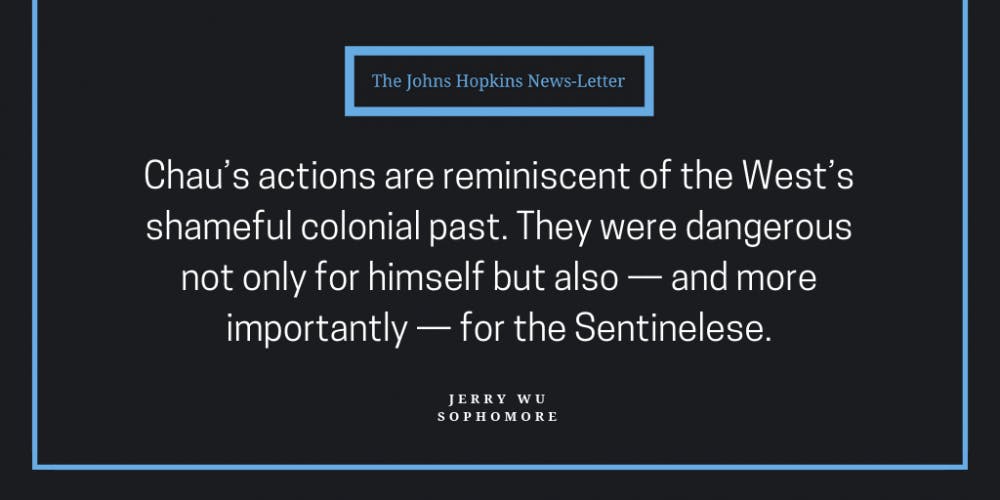John Allen Chau, an American missionary and adventurer, was killed by the Sentinelese, a tribe of 50 to 200 individuals indigenous to North Sentinel Island, a remote island in the Bay of Bengal on Nov. 17. According to the diary he left behind, Chau was attempting to convert the Sentinelese, one of the last remaining uncontacted peoples, to the Christian faith.
Before Chau’s death, attempts at sustained contact with the Sentinelese have ended in failure. Throughout the 1990s, the Indian government tried to establish contact through teams of anthropologists and medical officers. Although there were instances of friendly interaction, the teams were by and large met with hostility and violence, prompting the Indian government to adopt a policy of minimal interference.
Unsurprisingly, the Sentinelese did not take kindly to Chau’s attempt to make contact. Fishermen whom Chau hired for transport say he attempted to approach the islanders several times despite being rebuffed with violence each time. He was allegedly killed by arrows during his final attempt.
In reporting on Chau’s death, the media has focused on his adventurous lifestyle and devout Christian faith, creating a narrative of romantic exploration and tragic bravery. The Associated Press describes Chau “kayaking to a remote Indian island, home to a tribe known for attacking outsiders with bows and arrows, proved an adventure too far for the avid outdoorsman and Christian missionary.”
Conveying a similar sentiment, a piece in The New York Times described Chau as “a young American on a self-propelled mission to spread Christianity, revealed two things: that he was willing to die, and that he was scared.”
These are but two examples of the media portraying Chau in a positive, even heroic, light. Quotes from friends and family, included in nearly every article about this incident, further characterize Chau as “courageous, selfless and compassionate.”
However, this kind of reporting is irresponsible at best and dangerous at worst. The media’s effusive reporting may encourage others to do as Chau did. And we cannot allow an incident like this to happen again.
Chau’s actions are reminiscent of the West’s shameful colonial past. They were dangerous not only for himself but also — and more importantly — for the Sentinelese. As such, the media should stop lionizing Chau. It should focus instead on just how dangerous and irresponsible his actions were.
In the face of the tragedy that is death, we like to gloss over the deficiencies of the deceased individual and instead portray him or her in the best light. Indeed, had Chau’s actions been harmless to everyone except himself, the media’s positive portrayal would be perfectly acceptable.
But his actions were far from that. They evoke connotations of colonialism, images of the white man going into the jungle to civilize the “savage.” Chau’s diary reveals that he genuinely believed he was helping the Sentinelese by teaching them about Christianity. Even so, his objective is indelibly tainted with a racist paternalism — the notion that the West has the right or even duty to impose itself on supposedly less advanced societies because its culture or religion is somehow superior. The media needs to condemn this antiquated and dangerous ideology, not romanticize it.
Worse yet, Chau’s actions have potentially fatal ramifications for the Sentinelese. Having lived in isolation for thousands of years, the Sentinelese lack genetic immunity against many of the diseases of the modern world. Even a virus as mild to us as rhinovirus, responsible for the common cold, can prove fatal for isolated peoples such as the Sentinelese. Indeed, history is full of examples of indigenous peoples dying in great numbers after being introduced to foreign pathogens. During the Columbian exchange, up to 95 percent of the population indigenous to the Americas died from smallpox and measles, diseases endemic to the Old World. And in the 1960s, shortly after first contact with the outside the world, an epidemic of measles broke out among the Yanomami — an isolated people indigenous to the Amazon rainforest — killing hundreds. Any pathogen that Chau may have carried has the potential to infect the Sentinelese. Should this occur, Chau would bear sole responsibility for their deaths.
To the media’s credit, it has mentioned this possibility — but only in passing. The media needs to focus on this aspect of the story because of just how serious the repercussions are.
Chau’s death was a tragedy. But the media should not romanticize his death. This kind of coverage only encourages others to pursue similarly reckless acts, which not only evoke the shameful history of colonialism but also have potentially fatal consequences. There exists now the possibility of a tragedy greater than the death of one man — destruction of an entire people. Chau may have set that in motion.
Jerry Wu is a sophomore majoring in Molecular and Cellular Biology from Potomac, Md.





